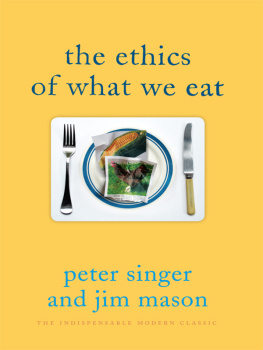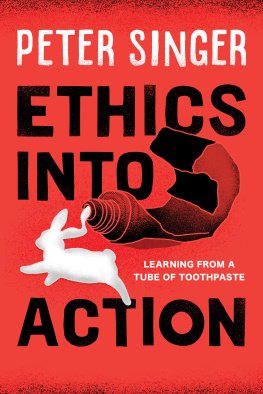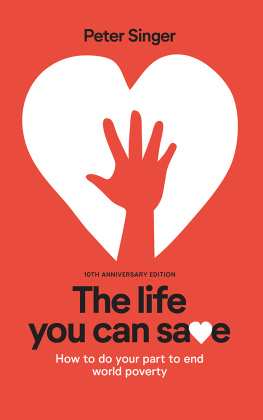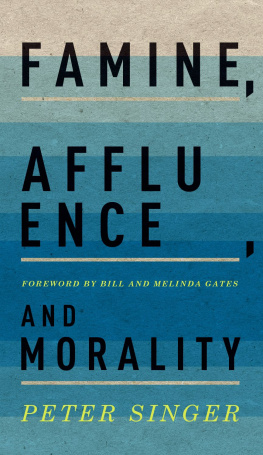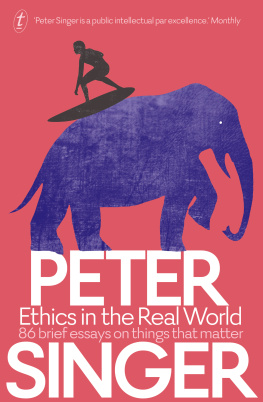Singer Peter - The Ethics of What We Eat
Here you can read online Singer Peter - The Ethics of What We Eat full text of the book (entire story) in english for free. Download pdf and epub, get meaning, cover and reviews about this ebook. City: Melbourne, year: 2007;2010, publisher: The Text Publishing Company, genre: Detective and thriller. Description of the work, (preface) as well as reviews are available. Best literature library LitArk.com created for fans of good reading and offers a wide selection of genres:
Romance novel
Science fiction
Adventure
Detective
Science
History
Home and family
Prose
Art
Politics
Computer
Non-fiction
Religion
Business
Children
Humor
Choose a favorite category and find really read worthwhile books. Enjoy immersion in the world of imagination, feel the emotions of the characters or learn something new for yourself, make an fascinating discovery.
- Book:The Ethics of What We Eat
- Author:
- Publisher:The Text Publishing Company
- Genre:
- Year:2007;2010
- City:Melbourne
- Rating:4 / 5
- Favourites:Add to favourites
- Your mark:
- 80
- 1
- 2
- 3
- 4
- 5
The Ethics of What We Eat: summary, description and annotation
We offer to read an annotation, description, summary or preface (depends on what the author of the book "The Ethics of What We Eat" wrote himself). If you haven't found the necessary information about the book — write in the comments, we will try to find it.
The Ethics of What We Eat — read online for free the complete book (whole text) full work
Below is the text of the book, divided by pages. System saving the place of the last page read, allows you to conveniently read the book "The Ethics of What We Eat" online for free, without having to search again every time where you left off. Put a bookmark, and you can go to the page where you finished reading at any time.
Font size:
Interval:
Bookmark:
PRAISE FOR
THE ETHICS OF WHAT WE EAT
Vital, urgent and disturbing.
New York Times
Absolutely gripping reading. Its made even more so bythe writers patient, often failed, attempts to interrogate 87corporations that had manufactured a product the families hadbought. Also interesting are the lengths some companies go to toavoid their gentle questioning. Its Michael Moore without theantics...The arguments in this riveting book descend on us gently,as a missionpossible or otherwiseshould we choose to accept it.
Sydney Morning Herald
Accessible and well-researched...Singer and Jim Mason do notjudge or preach; they accept that for many people, for manyreasons, ethical considerations do not loom large when decidinghow to feed their families...this book will provide, yes, here itcomes, serious food for thought.
Australian
Joining the dots from producer to plate, their book, The Ethicsof What We Eat, is a moral compass for those who care about theimpact of their food choices. Without proselytising, Singer andMason navigate questions of cruelty, the environment, economics,culture and social justice...an excellent, detailed and engaging guide.
Age
An absolutely indispensable book for anyone who thinksabout what they eat...[a] rare combination of a lively read andthorough research and investigation. I cannot recommend ithighly enough.
Jeffrey Moussaieff Masson,
author of When Elephants Weep
THE ETHICS OF WHAT WE EAT
Peter Singer was born in Melbourne in 1946, and educated at the University of Melbourne and the University of Oxford. He has been Ira W. DeCamp Professor of Bioethics at the University Center for Human Values, Princeton University since 1999, a position that since 2005 he has combined with an appointment as Laureate Professor at the University of Melbourne, attached to the Centre for Applied Philosophy and Public Ethics. An internationally renowned philosopher and acclaimed author, Peter Singer was also the founding president of Animals Australia, which represents over thirty organisations working to reduce the suffering of animals.
Jim Mason grew up on a family farm in the southwest Missouri Ozarks. He is an author, lecturer, journalist, environmentalist and attorney who specialises in humananimal concerns. Mason was the founding editor and a co-founder of The Animals Agenda, the US news magazine of the animal rights movement, and was elected to the US Animal Rights Hall of Fame in 2001.
OTHER BOOKS BY PETER SINGER
Democracy and Disobedience
Animal Liberation
Practical Ethics
Marx
Animal Factories (with Jim Mason)
The Expanding Circle
Hegel
The Reproduction Revolution (with Deane Wells)
Should the Baby Live? (with Helga Kuhse)
How Are We to Live?
Rethinking Life and Death
The Greens (with Bob Brown)
Ethics into Action: Henry Spira and the Animal Rights Movement
A Darwinian Left
Writings on an Ethical Life
Unsanctifying Human Life
One World: The Ethics of Globalisation
The President of Good and Evil: The Ethics of George W. Bush
Pushing Time Away
the ethics
of what we eat
peter singer
and jim mason

The Text Publishing Company
Swann House
22 William St
Melbourne Victoria 3000
Australia
www.textpublishing.com.au
Copyright Peter Singer and Jim Mason 2006
All rights reserved. Without limiting the rights under copyright above, no part of this publication shall be reproduced, stored in or introduced into a retrieval system, or transmitted in any form or by any means (electronic, mechanical, photocopying, recording or otherwise), without the prior permission of both the copyright owner and the publisher of this book.
First published in the US by Rodale 2006
First published in Australia by The Text Publishing Company 2006
This edition 2007
Reprinted 2009
Design by Chong Weng-ho
Typeset by J & M Typesetting
Printed and bound by Griffin Press
National Library of Australia
Cataloguing-in-Publication data:
Singer, Peter, 1946- .
The ethics of what we eat.
ISBN 978 1 921145 87 2.
1. Agricultural processing industries - Moral and ethical aspects. 2. Food animals - Moral and ethical aspects. 3. Natural foods - Moral and ethical aspects. I. Mason, Jim. II. Title.
CONTENTS
Part II
The Conscientious Omnivores
Part III
The Vegans
Part IV
Ethical Eating
We dont usually think of what we eat as a matter of ethics. Stealing, lying, hurting peoplethese acts are obviously relevant to our moral character. So too, most people would say, is our involvement in community activities, our generosity to others in need, andespeciallyour sex life. But eatingan activity that is even more essential than sex, and in which everyone participatesis generally seen quite differently. Try to think of a politician whose prospects have been damaged by revelations about what he or she eats.
It was not always so. Many indigenous hunter-gatherers have elaborate codes about who may kill which animals, and when. Some have rituals in which they ask forgiveness of the animals for killing them. In ancient Greece and Rome, ethical choices about food were considered at least as significant as ethical choices about sex. Temperance and self-restraint in diet, as elsewhere in life, were seen as virtues. Socrates, in Platos Republic, advocates a simple diet of bread, cheese, vegetables and olives, with figs for dessert, and wine in moderation. In traditional Jewish, Islamic, Hindu and Buddhist ethics, discussions of what should and should not be eaten occupy a prominent place. In the Christian era, however, less attention was paid to what we eat the major concern being to avoid gluttony, which, according to Catholic teaching, is one of the seven cardinal sins.
The way food is sold and advertised doesnt help. Despite the recent upsurge of farmers markets, in the developed world, almost all food is purchased from supermarkets. Shoppers are not presented with relevant information about the ethical choices that surround food. Instead, the food industry spends billions annually trying to make us crave their products. That buys an avalanche of advertising that sweeps down on us from all sides but tells us only what the advertisers want us to know. Marion Nestle, a nutritionist who worked in the US Department of Agriculture and on the Surgeon Generals Report on Nutrition and Health (1988), has described how the food industry has crossed ethical lines in bringing political pressure to bear on what should be dispassionate scientific government advice on how Americans can eat a healthy diet. Morgan Spurlocks Supersize Me raised serious ethical questions about the contribution of fast food chains like McDonalds to Americas epidemic of obesity. Our focus is not on these issues. There is already plenty of information out there about them. If you enjoy unhealthy food so much that you are prepared to accept the risk of disease and premature death, then, like a decision to smoke or climb Himalayan peaks, that is primarily your own business. Our focus is on the impact of your food choices on others.
A New Awareness
Over the last thirty years weve seen the first stirrings of a different kind of concern about what we eat. In Western Europe and the United States most veal is intensively reared, and many people there have stopped eating it after learning that veal calves are separated from their mothers soon after birth, deliberately made anemic, denied roughage or the possibility of exercise, and kept in stalls so narrow they cannot turn around. In the United States, veal consumption has fallen to less than a quarter of what it was in 1975.6 Consumers also increasingly seek out organically produced food, for reasons that range from an ethical concern for the environment to a desire to avoid ingesting pesticides and the conviction that organic food tastes better than food from conventional sources. Today, organic foods can easily be found in supermarkets and are the fastest growing section of the food industry.
Next pageFont size:
Interval:
Bookmark:
Similar books «The Ethics of What We Eat»
Look at similar books to The Ethics of What We Eat. We have selected literature similar in name and meaning in the hope of providing readers with more options to find new, interesting, not yet read works.
Discussion, reviews of the book The Ethics of What We Eat and just readers' own opinions. Leave your comments, write what you think about the work, its meaning or the main characters. Specify what exactly you liked and what you didn't like, and why you think so.

